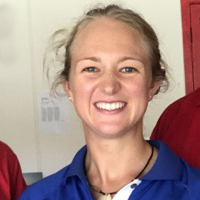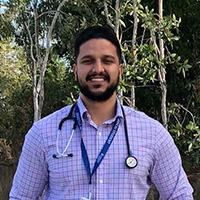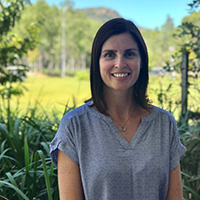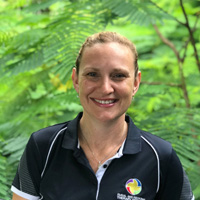Fast Facts
Location
Commencing
- Online: February, July
Fees
$32,292.00^
^estimated annual tuition fee for a full-time study load
Plus Student Services and Amenities fee
Fee deferral and scholarships available if eligible
Duration
1 year full-time
Entry Requirements
AQF level 7 bachelor degree in a relevant health discipline; or B Physiotherapy, B Occupational Therapy, or B Speech Pathology
Course Code
114807
Course detail
Maximise your professional expertise and extend your knowledge and skills in rehabilitation. In this one-year, full-time (or equivalent part-time) course, students choose from two streams — coursework or coursework and research — to build specialist knowledge, skills, and technical capability across a range of health contexts.
With a focus on tropical, rural, remote and Indigenous communities, you will undertake core subjects and select one of four majors (outlined below).
Students enrolling in this course as a pathway to a PhD must complete the coursework/research stream. Graduates may be eligible for credit towards a Master of Rehabilitation.
View the handbook for a detailed overview of subjects.
Inherent requirements
Inherent requirements are the identified abilities, attributes, skills, and behaviours that must be demonstrated, during the learning experience, to successfully complete a course. These abilities, attributes, skills, and behaviours preserve the academic integrity of the University’s learning, assessment, and accreditation processes, and where applicable, meet the standards of a profession. For more information please review the inherent requirements for the Graduate Diploma of Rehabilitation.
Majors
General
Enhance your health professional expertise in the field of rehabilitation across a variety of settings and client populations. Learn how to critically appraise and analyse research publications in the fields of health and rehabilitation and gain greater insight into the application of evidence-based practice.
Occupational Therapy
Extend your occupational therapy and rehabilitation knowledge to enable you to deliver services to people with chronic conditions or disability in a range of settings. You will develop advanced assessment and management skills in relation to rehabilitation and build a greater understanding of the research and theory base underpinning a range of health care domains.
Physiotherapy
Work with some of Australia’s most highly regarded physiotherapy and health professionals to expand your existing professional skills and experience. You will explore rehabilitation for people with chronic conditions, as well as specialty areas of practice such as burns, amputees and women's health. Develop advanced assessment and management skills in relation to rehabilitation, whilst applying evidence-based practice across a range of settings.
Speech Pathology
Be equipped with the most up-to-date knowledge and practical skills in the field of speech pathology. Enhance your current professional qualification/s to explore more specialised methods of diagnosing and managing adults and children with complex communication and swallowing disorders. This major will enhance your ability to apply evidence-based practice to optimise functional communication and quality of life.
A Graduate Diploma of Rehabilitation from JCU will equip you with recognised professional development that will increase your leadership skills and develop your career in a rehabilitation-related area of healthcare.
Graduates pursue careers in various areas including acute wards and rehabilitation settings with public and private health providers, aged care, private practice, policy development, or research.
You could pursue your specialisation in roles such as clinician, case manager, or researcher.
Handbook year | Information valid for students commencing in 2024 |
Course Code | 114807 |
Course type | Graduate Diploma (AQF Level 8) |
Owner | Academy |
College | Healthcare Sciences |
Award Requirements
Admission Requirements
Course pre-requisites | Completion of an AQF level 7 bachelor degree in a relevant health discipline, from this or another university (General major); or Applicants must have completed at least an AQF level 7 Bachelor of Physiotherapy, Occupational Therapy or Speech Pathology at an Australian university or hold an equivalent international entry level qualification in one of these professions (Physiotherapy major, Occupational Therapy major or Speech Pathology major). Note: Completion of this program will not enable Australian registration of overseas qualified health professionals. |
Minimum English language proficiency requirements | Applicants of non-English speaking backgrounds must meet the English language proficiency requirements of Band 3a – Schedule II of the JCU Admissions Policy. For students undertaking the Speech Pathology major, an overall IELTS of 7.0 with a minimum writing score of 6.0; speaking score of 8.0; reading and listening score of 7.0 is required. |
| Additional selection requirements | Information published by JCU or otherwise made available to students when applying, may specify additional criteria to be considered in ranking applicants in order of merit if the number of applications exceeds a quota or other limit on the places made available for the course. Information provided by applicants during the application process and any other information obtained by JCU in the application process may be used by JCU to rank applicants in order of merit by reference to those additional criteria. |
Post admission | Telephone and computer access with internet. Some subjects will require mixed mode attendance at the Townsville campus. |
Academic Requirements for Course Completion
Credit points | 24 credit points as per course structure |
Course learning outcomes | On successful completion of the Graduate Diploma of Rehabilitation graduates will be able to:
|
Inherent Requirements
Inherent Requirements | Inherent requirements are the identified abilities, attributes, skills, and behaviours that must be demonstrated, during the learning experience, to successfully complete a course. These abilities, attributes, skills, and behaviours preserve the academic integrity of the University's learning, assessment, and accreditation processes, and where applicable, meet the standards of a profession. For more information please visit: Postgraduate Rehabilitation. |
Reasonable adjustments | All JCU students have the opportunity to demonstrate, with reasonable adjustments where applicable, the inherent requirements for their course. For more information please visit: Student Disability Policy and Procedure. |
Course Structure
Students can choose from 2 streams: (1) coursework or (2) coursework and research; and from 4 majors: General, Physiotherapy, Occupational Therapy or Speech Pathology. If students enrol in this course as a pathway to a PhD, they must complete the coursework/research stream.
CORE SUBJECTS
RH5200:03 Rehabilitation Research and Evidence Based Practice
RH5202:03 Rehabilitation for Chronic Conditions
OPTIONS
Select a major (discipline area) from Table A
PLUS
Select Option 1 (Coursework subjects) or Option 2 (Coursework/Research subjects)
OPTION 1 (COURSEWORK)
Select 9 credit points of specified level 5 subjects from List 1
PLUS
Select 3 credit points of any postgraduate subject (can be cross-institutional if approved by the Course Coordinator)
List 1
HS5102:03 Qualitative Research Methods for Health Professionals
HS5800:03 Introduction to Lifestyle Medicine
HS5801:03 Health Coaching and Behaviour Change
HS5802:03 Models of Care and Innovation in Lifestyle Medicine
HS5803:03 Lifestyle Medicine Assessment and Prescription
OT5200:03 Advanced Practice Within the Rural and Remote Context
OT5202:03 Cultural Competency Principles in Australian Healthcare Practice
RH5201:03 Rehabilitation for Disability Across the Lifespan
RH5205:03 Palliative Care for Health Professionals
RH5206:03 Assistive Technology Strategies to Enable Personal Autonomy
TM5515:03 Epidemiology for Public Health
TM5516:03 Biostatistics for Public Health
TM5528:03 Health Promotion
TM5541:03 Managing Effective Health Programs
OPTION 2 (COURSEWORK/RESEARCH)
RH5203:06 Research 1: A Literature Review – Part 1 of 2
RH5204:06 Research 2: A Research Project – Part 2 of 2
TABLE A (MAJORS)
Type of major | Mandatory, single |
Credit points in major | 6 credit points |
Special requirements | Nil |
MAJOR | AVAILABLE AT | NOTES |
| General | External | Some subjects may require face-to-face attendance on campus in Townsville |
External | Some subjects may require face-to-face attendance on campus in Townsville | |
External | Some subjects may require face-to-face attendance on campus in Townsville | |
External | Some subjects may require face-to-face attendance on campus in Townsville |
Location
COURSE AVAILABLE AT | NOTES |
External | Some subjects may require face-to-face attendance at the Townsville campus |
Candidature
Expected time to complete | 1 year full-time or part-time equivalent |
Maximum time to complete | 4 years |
Maximum leave of absence | 1 year |
Progression
Course progression requisites | Nil |
Course includes mandatory professional placement(s) | Yes |
Special assessment requirements | At the discretion of the College Dean, students may be required to undertake a prescribed English language test to ensure that they have an acceptable level of English language proficiency, including at least at the level required to be admitted to the course, to safely participate in professional experience placements. |
Professional accreditation requirements | Not applicable |
Supplementary exam for final subject | A candidate who has failed the final subject towards the award and who gained 40% or more of the marks for that subject may be granted a supplementary examination in that subject. However if that subject is required for accreditation, then the criteria specified by that accreditation will apply. |
Credit
Eligibility | Students may apply for a credit transfer for previous tertiary study or informal and non-formal learning in accordance with the Credit Transfer Procedure |
Maximum allowed | 9 credit points, unless students have completed the Graduate Certificate of Rehabilitation, in which case they may be eligible for up to 12 credit points of credit for appropriate subjects. |
Currency | Credit will be granted only for studies completed in the 5 years prior to the commencement of this course. |
Expiry | Credit gained for any subject shall be cancelled 9 years after the date of the examination upon which the credit is based if, by then, the candidate has not completed the course of study prescribed for this course. |
Other restrictions | Not applicable |
Award Details
Award title | GRADUATE DIPLOMA OF REHABILITATION |
Approved abbreviation | GDipRehab |
Inclusion of majors on testamur | The major will appear on the testamur |
Exit with lesser award | Candidates who exit the course prior to completion, and have completed 12 credit points of appropriate subjects, may be eligible for the award of Graduate Certificate of Rehabilitation |
Course articulation | Students admitted to a Graduate Diploma of Rehabilitation may after completion of that award, gain credit for those studies towards a Master of Rehabilitation |
Special awards | Students may receive an Award of Recognition in accordance with the Recognition of Academic Excellence Procedure |
Estimated annual tuition fee: $AUD32,292.00
A Student Services and Amenities fee is payable per subject up to a maximum amount per year.
A variety of Scholarships are available to suit different student types.
Complete an online application through our Online Application Portal.
Real stories
-

Student
Tamara Matulick
Master of Rehabilitation
Doing the Master of Rehabilitation will help with career progression — especially in getting jobs I wouldn’t otherwise be able to get. You have to manage your time between work and study, but I think you’re more motivated as a learner because you’ve had situations where you can apply your experience and knowledge to.
-

Alumni
Daniel Behary
MBBS Student (JCU), MRehab (JCU), BPhty (USYD)
What inspired me to undertake Master of Rehabilitation at James Cook University is my passion for Interventional Cardiology and interest in Medical research. This course offered me the opportunity to explore the benefits of cardiopulmonary rehabilitation which is often required for patients with advanced heart disease.
-

Lecturer
Moira Smith
Course Coordinator, Rehabilitation
The Master of Rehabilitation is an exciting pathway in your healthcare career. There is a great variety of subjects to help upskill in the area of rehabilitation, addressing perspectives from many different disciplines. Whatever your aim, this course will assist the development of your skill set in rehabilitation.
-

Employer
Kathy Luke
RAR Therapy Director
This course provides practical and evidence-based clinical skills that apply to the community work environment and ultimately benefit our clients. With an increased need for highly skilled therapists in community settings, this course is perfect for extending therapists’ knowledge and skills for clinical practice.